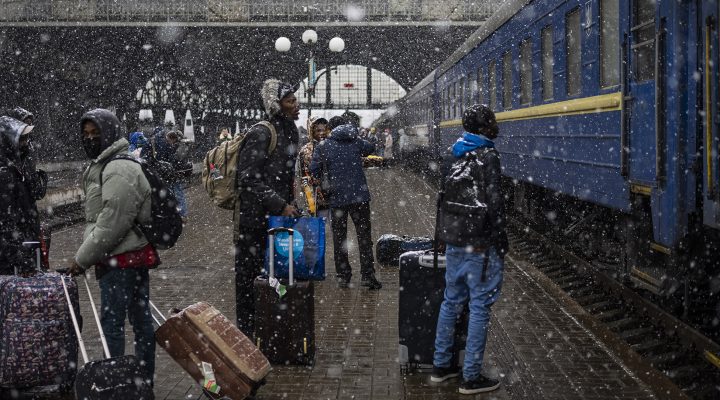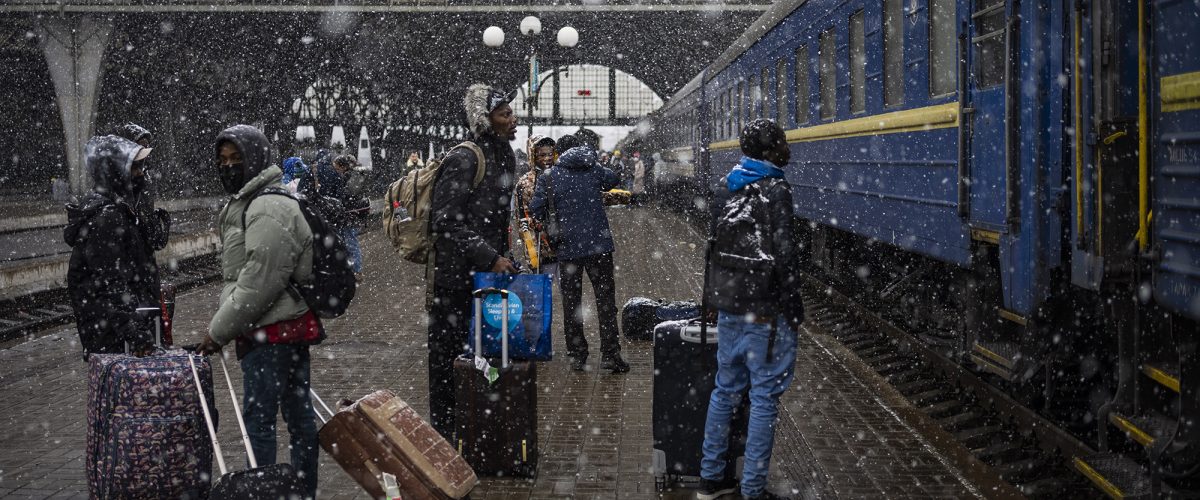When Russian President Vladimir Putin made good on his threat to invade and unleash war on Ukraine Feb. 24, 2022 — one year ago today — not many people in Africa, thousands of kilometers away, imagined they would pay a heavy price for it.
The immediate concern for many Africans was the thousands of their countrymen and women, most of whom were students in Ukraine, who could not escape the country within the short notice of Putin’s threat and invasion. While signs indicated things could go wrong with an invasion, many still hoped diplomacy could prevail and the brewing crisis would be nipped in the bud.
That didn’t happen, and Putin had his way. A year later, the impact on Africans generally has been huge. And negative.
Thousands of Ukrainian-based Africans saw their businesses or education destroyed or disrupted by the war. Beyond that, millions of people in Soweto, Lusaka, Tamale, Diourbel, Abakaliki and other villages and towns in Africa continue to feel the heat of conflict.
John Chizea, an associate professor of economics at Baze University in Nigeria, said the impact can be measured in the prices of food and commodities like oil.
“There have been indirect impacts on the African economy flowing from the impact of the war on the global economy.”
Given “the distance between Africa and the Russian-Ukraine conflict, there is no direct impact because of the conflict,” he said. “However, there have been indirect impacts on the African economy flowing from the impact of the war on the global economy.”
Grain and oil
Ukraine is a major grain exporter and accounts for a large chunk of the grain consumed in Africa and other parts of the world. Due to the conflict, supply chains for the Ukrainian grain have been disrupted, leading to soaring prices globally.
Apart from agricultural products like grain, Ukraine and Russia are major oil producers, and any disruption in that sector affects global oil prices, Chizea said, noting African economies, such as Nigeria and Angola, rely heavily on oil exports.
Some African countries also have trade relations with Russia, and sanctions imposed by the international community have had a spiraling effect on Africa. “Economic sanctions on Russia have had a ripple effect on African economies that trade with Russia,” he explained.
“Some African countries, such as Egypt, Algeria and South Africa, have significant trade relations with Russia, particularly in the areas of mineral resources and arms trade. These trade relations have been disrupted by economic sanctions and have had a negative impact on the affected African economies.”
As a result of these combined factors, prices of goods and services have skyrocketed to the point many African economies are experiencing the worst inflation in decades, with many citizens barely managing to survive as their incomes hardly sustain them. The situation is made worse by the fact many African countries already were struggling financially before the war, thanks to Covid.
Inflation’s impact
In a recent article, “One Year Later: The Impact of the Russian Conflict with Ukraine on Africa,” Bitsat Yohannes-Kassahun of the UN Office of the Special Adviser on Africa stated: “In addition to pressures from fluctuations in exchange rates and high commodities prices, inflation reached double digits in 40% of African countries. … Seven African countries are in debt distress as of January 2023, and 14 more are at high risk of debt distress, which makes them unable to implement meaningful countermeasures.
“African households who … already spend over 50% of their overall consumption on food and energy, felt the significant impact of the high conflict-induced global energy prices.”
“As a result, African households who … already spend over 50% of their overall consumption on food and energy, felt the significant impact of the high conflict-induced global energy prices, along with their indirect effects on the cost of transportation and consumer goods.”
While some African countries had begun implementing policies to tackle the harsh economic situation they found themselves in even before the Ukraine war, they need to do more, Chizea argued.
“Policymakers in African countries need to take additional measures to mitigate the impact” of the war, he said. “These measures could include fiscal stimulus packages to support the economy, trade diversification efforts to reduce reliance on affected countries and targeted support for sectors most impacted by the fallout of the war.”
The challenge is Africa’s limited resources in the face of competing priorities. To that extent, the “effectiveness of policy responses will depend on a variety of factors, including the specific policies implemented, the institutional capacity to implement and monitor them, and the level of support and cooperation from international partners,” he said.
Learn to manage
In light of the war’s challenges, Chizea expects African leaders to learn to manage their economy and food security. New measures should include diversifying their countries’ economies and reducing reliance on exports of primary commodities, such as oil or minerals that are subject to price volatility and market fluctuations, he said.
He also called for strengthening regional trade and cooperation to reduce the risks of economic disruption caused by conflicts or geopolitical tensions, as well as taking “steps to enhance their food security by investing in agriculture and rural development, improving infrastructure and logistics, and promoting sustainable and climate-resilient agricultural practices.”
The impact upon the academic dreams of many Africans studying in Ukraine have varied by situation.
The Brookings Institution reported more than 16,000 African students were studying in Ukraine before the outbreak of war, accounting for more than 20% of Ukraine’s international students.
Many of them suffered discrimination or racism in their bid to escape the war. The Brookings report quotes a Zimbabwean medical student as saying trying to leave Ukraine after the war broke was fraught with discrimination. Ukrainians and Europeans ranked at the top of the hierarchy, Indians and Middle Easterners sat in the middle, and Africans languished at the bottom.
Some African students who escaped the war have continued their education online with their Ukrainian universities. Other students gained admission in other countries, while some have not been successful in their quest to be absorbed by institutions outside Ukraine. Some who applied for asylum in neighboring European countries were turned down.
Struggling for footing

Nwabude Chidubem Emmanuel
Nwabude Chidubem Emmanuel, a Nigerian pharmacy student who was enrolled at Bogomolet National Medical University in Kyiv, said he and others are still struggling to gain a footing as foreign students in Germany.
“For now, we are still enrolled as exchange students and not regular students,” he said. “We are looking for [the] possibility of [a] third exchange program, which happens to be the last exchange program for us. The city [Kassel] only exchanges international students for at most two semesters. But they are trying to make an exception for us, and after that, we can now start looking for what next we have to do.”
Asked how he feels about the Ukraine-Russia war, Emmanuel said: “I am surprised, but what can I do? I thought by now they would have found a compromise.”
He still follows events in Ukraine and is unable to shake off memories of Kyiv before the bombardment. “I watch the news and see that some places I held dear to my heart have been bombed down,” he said.
Perhaps, someday, after peace returns to the country, he might return there. Until then, Germany fills the void. “I have not fully adapted [to life in Germany] but will continue to absorb the changes and the new environment” until it gets better, he said.
Anthony Akaeze is a Nigerian-born freelance journalist who lives in Houston. He covers Africa for BNG.
Related articles:
In Ukraine: ‘We cannot just preach like we did before the war’
Russia’s attacks on Ukrainian religious sites are war crimes
Report from Ukraine: ‘In the midst of the suffering, God is at work’


